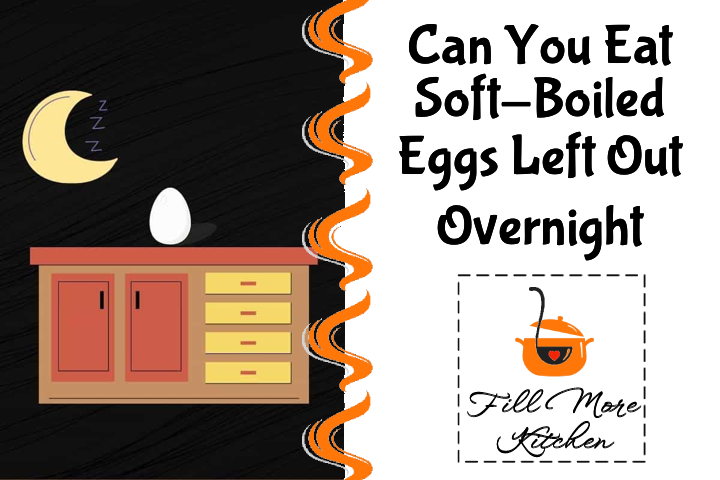Perhaps you prepared a considerable quantity of soft-boiled eggs during the late hours of the night for an upcoming event, and left them out without refrigeration.
Is it safe to consume soft-boiled eggs left out overnight or should they be discarded?
If you have left soft-boiled eggs out overnight, it is not safe to consume them as they can cause food-borne illnesses. To avoid the risk of getting sick, it is recommended that you do not eat soft-boiled eggs that have been left out for more than two hours after cooking and instead either consume or refrigerate them immediately after cooking.
Although it may seem concerning, there is no need to fret as long as you follow proper food handling and storage procedures since soft-boiled eggs are completely safe.
Continue reading if you wish to learn further about the proper methods of preparing and preserving your soft-boiled eggs.
What Happens If You Eat a Soft-Boiled Egg Left Out Overnight?
Leaving soft boiled eggs at room temperature for more than two hours can result in a significant increase in bacterial growth, which can lead to unpleasant taste and high levels of bacteria if they are left out overnight.
Soft-boiled eggs have a shorter shelf life compared to hard-boiled eggs, whether stored in or out of the refrigerator. The partially cooked yolk of soft-boiled eggs provides an ideal environment for bacterial growth, making it more susceptible to contamination when left at room temperature.
If the temperature is 40 degrees Fahrenheit (4 degrees Celsius), a soft-boiled egg left out for more than two hours should not be consumed, and if your home is warmer than this, it should be discarded after an hour or less.
If you want to ensure the safety of a soft-boiled egg, it is recommended to eat it immediately after cooking. This applies to most egg dishes, but especially for those that are cooked lightly.
How Do Eggs Go Bad?
Raw eggs spoil because of the growth and propagation of bacteria within the egg, which is usually present both internally and externally, leading to an increase in bacterial population that eventually results in the decay of the egg.
When an egg decays, its interior typically changes to a yellowish-green hue and emits a strong sulfur odor due to the breakdown of proteins.
Salmonella, which is usually found on the outside of eggshells, is prevented from spreading by washing eggs immediately after they are collected from hens in countries such as the United States, Australia, and Japan.
Nevertheless, leaving soft-boiled eggs at room temperature overnight can accelerate the decay process by opening the eggshell pores and allowing bacteria to enter, which is why refrigeration is mandatory in some countries to inhibit bacterial growth.
Raw eggs can last for a considerable period if they are stored correctly, and washed eggs should always be kept at 45 degrees Fahrenheit (7 degrees Celsius) before cooking to ensure their longevity and safety for consumption.
How Should Soft-Boiled Eggs Be Stored?
If you want to keep soft-boiled eggs fresh, it is recommended to store them in sealed containers or an airtight container. It is important to refrigerate the eggs unless they are going to be eaten immediately. If you prefer to keep the eggs in their shells, you can store them in the egg carton.
If you want to store your soft-boiled eggs, you can keep them in a sealed container filled with cold water. However, it is important to change the water every day.
Avoid using warm or contaminated water and instead opt for filtered cold water from a refrigerator or bottled water kept at a low temperature.
How Should You Serve Soft Boiled Eggs?
There are numerous ways to enjoy soft-boiled eggs, including Brulee and sliced options. While serving them in an egg cup with salt and pepper is simple, there are many other possibilities to explore.
Starting with the optimal quality, it is recommended to serve soft-boiled eggs immediately after preparation. If refrigerated, reheating is necessary before consumption, which may result in a firmer yolk texture than preferred.
Soft-boiled or soft-cooked eggs are used in a modified version of the popular New York City dish, Eggs Benedict, which involves placing two halves of the egg on an English muffin and topping it with hollandaise sauce.
If you want, you have the option to remove the shell of your soft-boiled eggs, cover them in breadcrumbs, and submerge them in hot oil. During frying, the yolk may undergo further cooking; however, due to the damp consistency of the soft-boiled egg, it will not become dehydrated.
Buttered toast can be served with sliced soft-boiled eggs, where the soft yolk blends perfectly with the drier bread, making it a simple and delightful dish.
How Long Can Soft-Boiled Eggs Be Stored?
Soft eggs can be safely stored in a secure, sealed container in the refrigerator for a maximum of two days while maintaining a temperature range of 34-45 degrees Fahrenheit (2-7 degrees Celsius).
Soft-boiled eggs have a shorter shelf life than hard-boiled eggs when kept in the refrigerator. Unlike hard-boiled eggs, which can last for a week whether they are stored with or without their shells in water, soft-boiled eggs do not have the same longevity.
The reason why hard-boiled eggs have a longer shelf life compared to soft-boiled eggs is due to the fact that the yolk in hard-boiled eggs is completely cooked. During the cooking process, hard-boiled eggs are exposed to higher temperatures which effectively eliminate more bacteria, reducing the likelihood of spoilage.
We advise against freezing soft-boiled eggs as they do not freeze well and lose their shape, regardless of whether they are fried, boiled or soft-boiled.
Soft-boiled eggs have a tendency to become grainy and crumble easily, resulting in an unpleasant taste and texture. Therefore, it is recommended to prepare them fresh and consume immediately.
How Can You Tell If a Soft-Boiled Egg Has Gone Bad?
If you want to check if your soft-boiled eggs have spoiled, the most effective method is to use your sense of smell. While it’s not the only indicator, the odor of eggs is a dependable way to determine their freshness. When eggs begin to deteriorate, they emit a strong and unpleasant sulfuric smell that is hard to miss.
Color changes in the yolk and egg whites can be observed when soft-boiled eggs begin to decay.
When left out overnight, the yolk of a soft-boiled egg may turn green or grey and affect the whiteness of the yolk, resulting in a damp, grey yolk with a strong sulfur smell when cut open.
Can You Get Salmonella From Soft Boiled Eggs?
Salmonella can be contracted from eggs regardless of their cooking state, but there is no increased risk of salmonella in soft-boiled eggs compared to hard-boiled ones.
Salmonella is typically eliminated when food is cooked thoroughly, which underscores the significance of ensuring that animal products reach a specific temperature before consumption.
Consequently, salmonella is usually transmitted from an infected surface to the food, making it the primary mode of contamination rather than the bacteria that may already exist in the food.
The most important thing is to ensure that you thoroughly wash your hands before and after handling soft-boiled eggs, as salmonella is typically found on the exterior of the eggshell.
After cooking soft-boiled eggs, it is advisable to either refrigerate them promptly or eat them right away to prevent the growth of bacteria that can thrive when they are left out at room temperature.
Should You Wash the Outside of an Egg Shell Before Cooking/Boiling It?
It is not advisable to wash eggs before cooking them, especially if you live in a country where eggshells are not cleaned at an industrial level before reaching the store, as washing them may actually introduce bacteria into the egg instead of removing it.
Eggs possess minuscule pores all over their shell. It’s important to note that these serve as the breeding grounds for chicks to develop and emerge, hence they require air.
The pores of a soft-boiled egg are too tiny to allow the runny yolk to escape, and they also act as a barrier against harmful bacteria that could harm the developing chick.
By washing your eggs, you increase the friction on the eggshell, which opens up the pores and creates a thin layer for bacteria to slip through and settle into the egg.
That is the reason why eggs in certain countries, including the USA, need to be stored in a refrigerator, while in several South American countries they do not require refrigeration. This is because the shells of eggs in those countries have not been affected by industrial cleaning techniques and can remain fresh for a few weeks when kept on a shelf.
Thus, in case you come across any regions where unwashed eggs are available for sale on the shelf, it is advisable not to purchase them and clean them at home. It is better to cook them as they are and ensure that you wash your hands thoroughly after handling them.
You can also check this video about “Can You Eat Soft-Boiled Eggs Left Out Overnight?”
Check out our top 10 reviews!
Related posts
https://fillmorekitchen.com/why-wont-my-toaster-oven-turn-on-fix/
https://fillmorekitchen.com/can-you-eat-turkey-left-out-at-room-temperature/
https://fillmorekitchen.com/can-a-fridge-be-too-full/
https://fillmorekitchen.com/is-sous-vide-the-same-as-boiling/
https://fillmorekitchen.com/how-long-can-you-leave-a-slow-cooker-on-is-it-really-safe/



